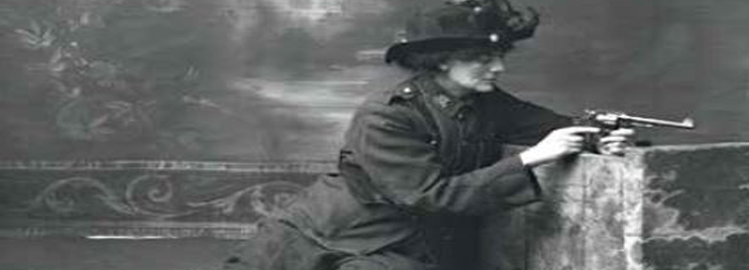International Women's Day: Constance Markievicz (1868–1927) Great Irish Speeches

To celebrate International Women’s Day we have shared Constance Markievicz’s speech to the Students’ National Literacy Society, Dublin, 1909 from The Pocket Book of Great Irish Speakers. Over a century later her words still ring true. Happy International Women’s Day!
Great Irish Speeches: Constance Markievicz (1868–1927)
Constance Gore-Booth was born in London into the Ango-Irish Protestant ascendancy. She studied art in London and married a Polish count, Casimir Dunin Markievicz. She developed an interest in women’s suffrage and active Irish nationalism, joining Sinn Féin and the Daughters of Ireland. During the Lockout in 1913 she provided aid to striking Dublin workers and their families, and in 1916 she participated in the rising, fighting in St Stephen’s Green.
She was sentenced to death but reprieved. She became the first female MP elected to the House of Commons, but she took her seat instead in the First Dáil in 1919, serving as minister for labour.
‘Now, here is a chance for our women.’
From her speech to the Students’ National Literacy Society, Dublin, 1909:
I take it as a great compliment that so many of you, the rising young women of Ireland, who are distinguishing yourselves every day and coming more and more to the front, should give me this opportunity. We older people look to you with great hope and a great confidence that in your gradual emancipation you are bringing fresh ideas, fresh energies and above all a great genius for sacrifice into the life of the nation.
Lately things seem to be changing … a strong tide of liberty seems to be coming towards us, swelling and growing and carrying before it all the outposts that hold women enslaved and bearing them triumphantly into the life of the nation to which they belong. Women, from having till very recently stood so far removed from all politics, should be able to formulate a much clearer and more incisive view of the political situation than men. For a man from the time he is a mere lad is more or less in touch with politics, and has usually the label of some party attached to him, long before he properly understands what it really means.
Now, here is a chance for our women. Fix your mind on the ideal of Ireland free, with her women enjoying the full rights of citizenship in their own nation, and no one will be able to sidetrack you, and so make use of you to use up the energies of the nation in obtaining all sorts of concessions – concessions too, that for the most part were coming in the natural course of evolution, and were perhaps just hastened a few years by the fierce agitations to obtain them. You will go out into the world and get elected onto as many public bodies as possible, and by degree through your exertions no public institution – whether hospital, workhouse, asylum or any other, and no private house – but will be supporting the industries of your country. Tommy Moore, the popular poet of his day and also many days later, has set Ireland a very low ideal of woman to worship. To him, woman is merely sex and an excuse for a drink. Not a companion or a friend, but a beautiful houri holding dominion by her careful manipulation of her sex and her good looks.
The better ideal for women who, whether they like it or not, are living in a work-a-day world, would be – If you want to walk around Ireland, or any other country, dress suitably in short skirts and strong boots, leave your jewels and gold wands in the bank, and buy a revolver. Don’t trust to your ‘feminine charm’ and your capacity for getting on the soft side of men, but take up your responsibilities and be prepared to go your own way, depending for safety on your own courage, your own truth and your own common sense, and not on the problematic chivalry of the men you may meet on the way.
A consciousness of their own dignity and worth should be encouraged in women. They should be urged to get away from wrong ideals and false standards of womanhood, to escape from their domestic ruts, their feminine pens. We have got to get rid of the last vestige of the Harem before woman is free as our dream of the future would have her.
About the Book
The Pocket Book of Great Irish Speakers. Inspiring and Provocative Speeches from 1782 - Today. Compiled by Tony Potter
Some of the finest speeches ever made have been spoken in Ireland. This book highlights 45 eminent and influential speeches, from Robert Emmet’s defiant speech from the dock on the eve of his execution, to Panti Bliss’s passionate 21st century oratory in support of gay marriage in Ireland. With a short biography of each speaker and highlights of their selected speech, this book features some of Ireland’s most inspiring and evocative speakers, from politics to the arts.
Follow us at @Gill_Books on Twitter, gillbooks on Instagram and like us on Facebook to keep up to date with our latest news and events.
Ireland’s favourite President is back – this time with a ...
© 2024 M.H. Gill & Co. Unlimited Company